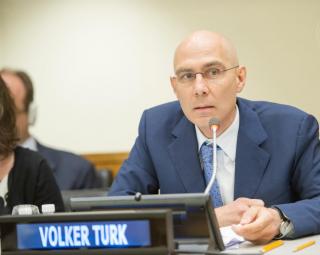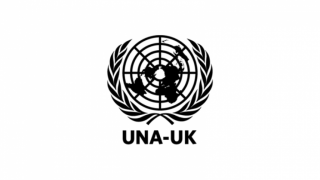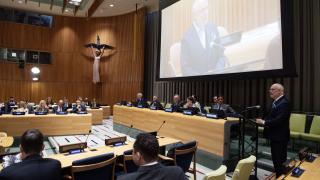
On Thursday (8 September) the General Assembly appointed the Secretary-General’s chosen candidate - Volker Türk - to the position of UN High Commissioner for Human Rights.
UNA-UK welcomes Mr Türk’s appointment and stands ready to support him and his office in the face of the formidable array of human rights challenges ahead. UNA-UK champions the work of the United Nations while offering constructive feedback where we see room for improvement. Lessons can be learned from the selection process that led to Mr Türk’s appointment, which lacked inclusivity, transparency and was not carried out in a timely manner. We firmly believe that robust appointment processes serve to strengthen the mandate and office of the appointee, and build trust in the United Nations.
Mr Türk’s nomination came a week after the conclusion of Michelle Bachelet’s tenure on 31 August, and, after a period of uncertainty, his start date has now been confirmed for 17 October. Until then, while the 51 session of the Human Rights Council is in progress, deputy high commissioner Nada Al-Nashif is performing the role of acting high commissioner.
Ahead of and throughout this recruitment, we called for a fair, open and inclusive selection process geared towards finding the strongest possible candidate. We joined over 60 civil society organisations in a public call to the Secretary-General and published our own Transparency Checklist to scrutinise the process, using the UN’s own best practise and principles to hold a mirror up to the organisation. Through this we hoped to encourage greater transparency, accountability and ultimately a stronger Office of the High Commissioner for Human Rights.
Our Transparency Checklist shows that:
- The selection process was not launched in a timely fashion raising concerns that the process was rushed. As a consequence, the current session of the Human Rights Council is proceeding in the absence of a High Commissioner.
- The short timeframe for applications and widely anticipated start date of 1 September (the date the previous postholder’s tenure ended), may have reduced the quality of the pool of candidates since individuals of the calibre befitting the role would likely have significant notice periods (senior officials at the UN itself typically have a 3 month notice period.)
- The job advert does not appear to have been widely publicised through UN channels; UNA-UK found no record of it being shared on the organisation’s social media channels, nor does it appear to have been advertised in traditional media sources. UNA-UK together with colleagues at human rights organisations publicised the vacancy widely through our networks; however, the apparent lack of UN outreach may have reduced the breadth of the field of candidates.
- Contrary to the UN’s own guidance, a number of elements relating to the process were not disclosed including: information related to the geographic spread and genders of interviewees, explanation of how the interview panel was constituted, and how many members served on the interview panel.
- The selection committee’s outreach to civil society was limited and rushed - civil society consultation appears to have been contained to one closed-door New York meeting arranged at short notice, although we have been told that the selection committee did take on board points made in letters they received from civil society.
A lack of transparency and inclusivity in UN senior appointment processes is not new. UNA-UK is committed to building on our 1 for 7 Billion campaign which was instrumental in transforming the Secretary-General selection process and campaigning for greater transparency and accountability across the UN system.
Enyseh Teimory, Head of Policy at UNA-UK said:
The world urgently needs an advocate who won’t hesitate to act and will be courageous in using their voice. We hope Mr Türk will stand up for the vulnerable, stand behind those defending their rights and stand up to abusers, whoever they may be.
UNA-UK stands ready to continue to work with the UN to ensure that merit-based recruitment processes can strengthen the organisation and its effectiveness.
Phil Lynch, Executive Director at International Service for Human Rights (an international human rights organisation also following this process) said:
The lack of transparency and meaningful consultation with independent civil society in the selection process meant that the Secretary-General missed a key opportunity to build the legitimacy and authority of the next High Commissioner.
Process matters
If a postholder is widely perceived to have come through a competitive and inclusive process they will benefit from increased legitimacy. In turn, this gives them a stronger mandate to act (in this case) on the urgent human rights issues the world faces. In contrast, highly politicised or opaque recruitment practices can not only mean that the most effective candidates are overlooked but also that the appointee, no matter how qualified, is denied the legitimacy conferred by a robust process. It also leaves the UN vulnerable to charges of unfairness and conflicts of interest.
The scale of the challenges facing the UN’s human rights work cannot be overstated and missed opportunities to strengthen the legitimacy of this Office can scarcely be afforded. From Russia’s war in Ukraine, to forgotten crises in Yemen and Myanmar, China’s violations in Xinjiang to establishing robust human rights responses to climate change - the new High Commissioner must contend with a global context in which human rights are under threat or in retreat, including in established democracies. Against this backdrop, it is essential that the High Commissioner is empowered to act without fear or favour to any member state, and in close partnership with civil society and human rights defenders.
Prior to this appointment, Mr Türk worked in the Secretary-General’s Executive Office as Under-Secretary-General for Policy where his responsibilities included the follow-up to the ‘Our Common Agenda’ report and continued work related to strategic coordination within the Executive Office. His UN biography states that he was responsible for ensuring system-wide coordination on the Secretary-General’s ‘Call to Action for Human Rights’. Prior to moving to the UN headquarters in New York in 2019, Mr Turk gained almost 20 years’ experience working with the UN Refugee Agency (UNHCR) both at their Geneva headquarters and in the field.
Read more:
- Statement from UN Secretary-General on the appointment of Volker Türk as HCHR
- Statement from Human Rights Watch on next HCHR
- Statement from ISHR on next HCHR and the appointment process
- An opinion piece from Igarapé Institute on what they hope to see from the HCHR
Photo: Volker Turk briefs Member States in 2016 as then-Assistant High Commissioner for Protection. Credit: UN Photo/Rick Bajornas.






